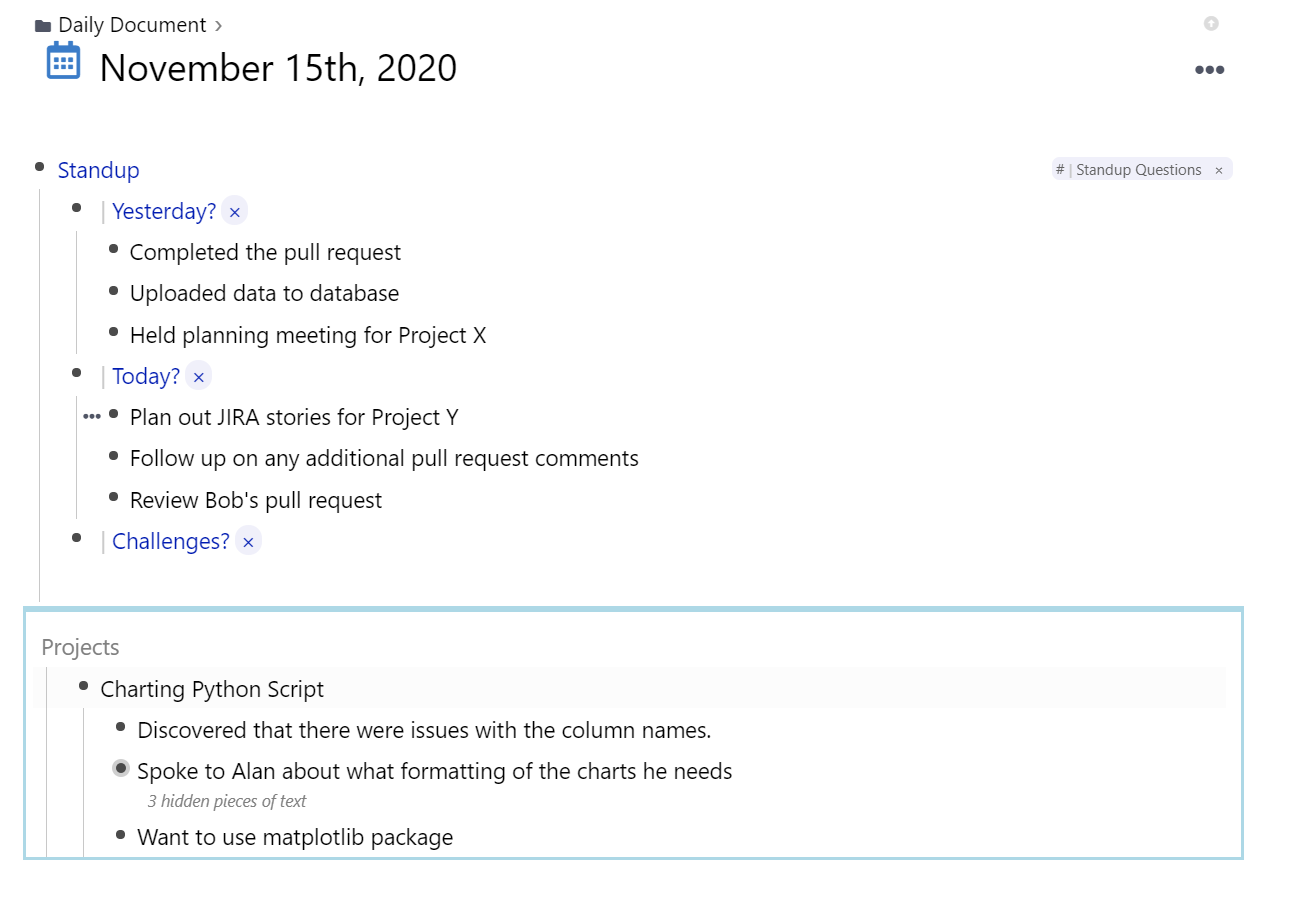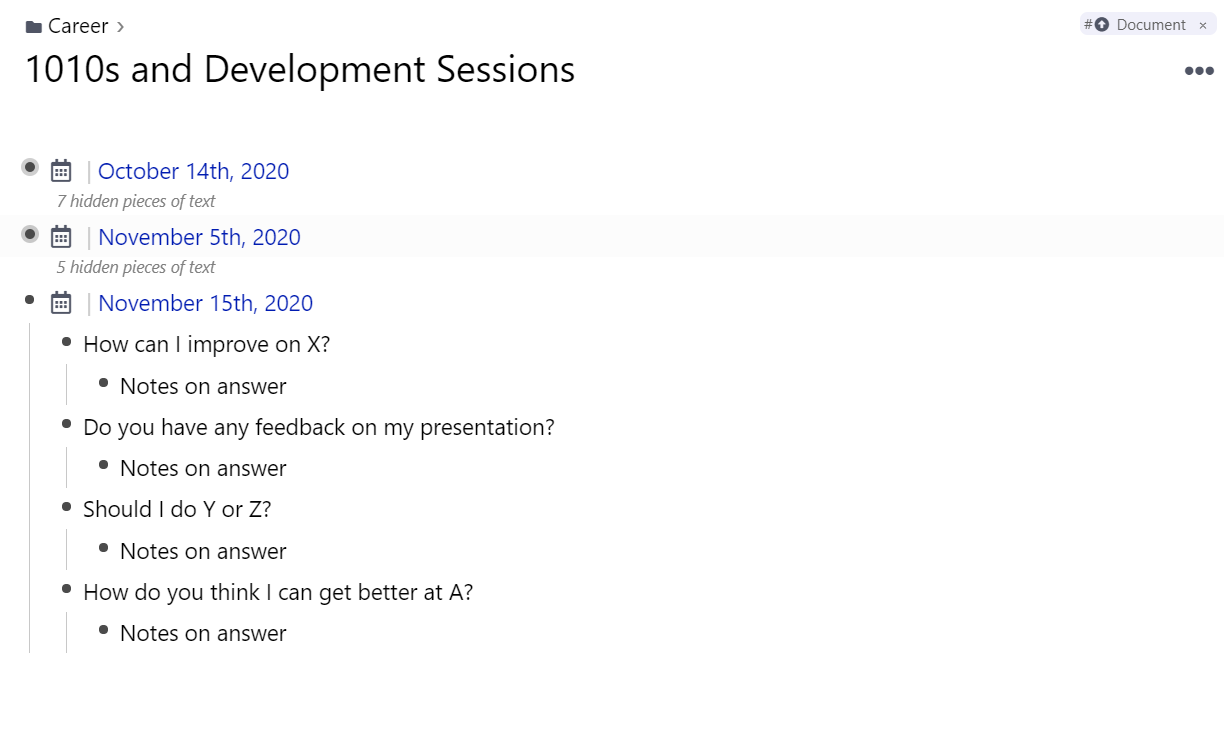3 Benefits of Work Journalling
So what is a Work Journal?
What do you picture when you read the word journalling?
You probably think of a person at their desk, or in their bed. Either early in the morning, or late at night. They're scribbling down the days events, and reflecting on how they were today. Were they productive? Were they moral? Did they eat too much?
There are dozens of articles and videos out there, advocating for a journalling habit. This blog post, is not that. I'm focusing in on work journalling.
Work journalling, to me, is essentially a daily practice of writing notes and thoughts related to your work, throughout your workday. Everyday. It's almost like a stream of work focused conscience.
Work Journalling is a daily practice of writing notes and thoughts related to your work, throughout your workday. Everyday. It's like a stream of work focused conscience.
So what does that look like in practice? Here are a few examples of what I do:
Daily Standup Notes
Jot down some bullets of what you want to say, keep track of key bits of information discussed in the meeting
Project Notes
Note down some of the issues you encounter, note down ideas that have sparked in your head, note down things you learnt whilst trying to complete the task.
1 to 1 Meeting Notes
Note down actions your manager wants you to take, note down questions you have for them, note down actions they said they will take, so you can follow-up with them.
Why keep a Work Journal?
1. Focus
In 2011, HBR published an article "Four reasons to keep a work journal". In the post, they speak to Sarah, an MBA student, about her reaction to being asked to keep a work journal.
At the time, as a busy MBA student, this seemed uncomfortable and time-consuming. I needed to be working and networking, not taking time to write about perceptions and feelings.
I like this quote because I often feel really similar. I'll think to myself, “I just need to dive into the code and start making functionality”. But Sarah goes on to say after keeping a work journal, it gave her a lot of patience and sharpened her ability to plan. Why is this?
My theory is that keeping a work journal enforces you to slow-down, and naturally take a step back away from code or whatever your task is and reflect on the steps you need to take, how to best do them and so on.
It's like your English teacher used to say to you when writing essays, ALWAYS MAKE A PLAN FIRST.
2. Knowledge
Scientia potentia est = Knowledge is power
As the saying goes, knowledge is power. Succeeding at work, often means speaking up with confidence, making good decisions and performing work effectively.
All of the above, are augmented with knowledge. By keeping a work journal, you have a powerful record of knowledge.
Discussions, facts, numbers, decisions, tools, tricks & tips. All of this you can use to your advantage. This is especially true, if you use a digital tool such as RemNote, Evernote, OneNote. Anything that has a strong search functionality, means in seconds you can recall that meeting from 6 months ago where you boss said X, Y and Z.
3. Reflection
Just like with regular "journalling", a work journal can encourage greater self-reflection.
Let’s say you're working on a project and you start writing down an issue that has come up.
As we said before, the act of writing this issue down slows you down. In fact, it takes longer to write (or type) out the issue, than it does to think it. So whilst you're writing, your brain is rapidly processing and thinking of ideas, thinking of different approaches you might've taken and things you may have just learnt.
So once you’ve written down your issue, you’re ready to just continue your stream of consciousness and write your reflections. Reflections that you will imbibe and act upon next time you are faced with such an issue.
Go forth and journal!
Hopefully I’ve convinced you to give work journalling a try. If you liked this article, please leave a comment and let me know! I’d love to hear from you.
Coming soon I will make a post on how I keep a work journal using RemNote, my current main notetaking application! So stick around for that!
Follow Me!
Before you go any further, if you’re enjoying my content, please consider subscribing to both my Newsletter, and my YouTube channel for more!









How to split finances with your partner. I share my thoughts on some common approaches to splitting finances with your partner, and what I view as pros and cons to these methods. I also share what I currently do.